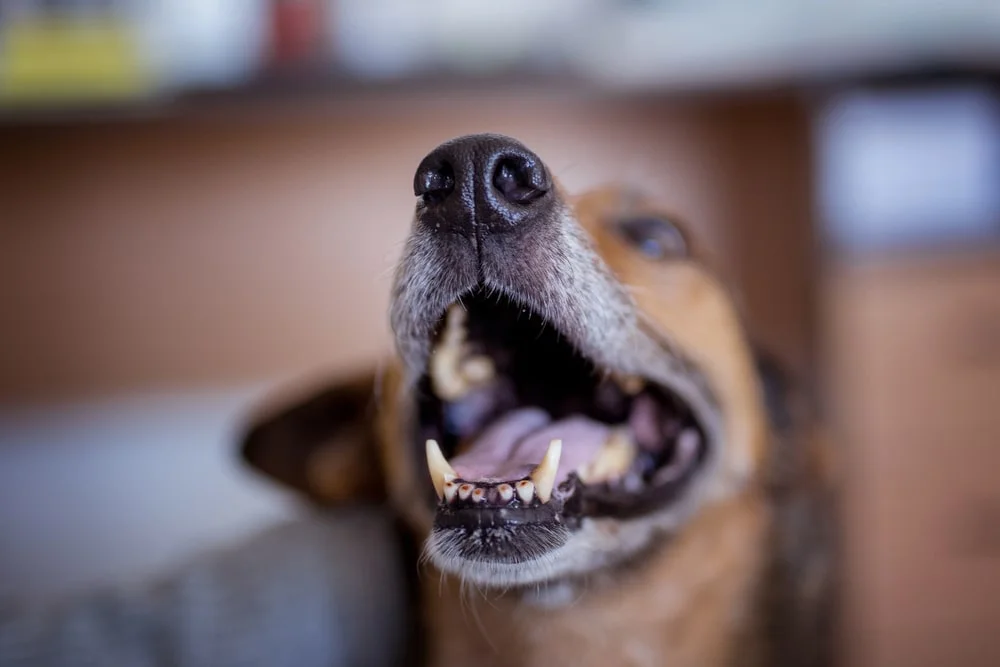PET CARE
Every dog lover enjoys spending quality cuddle time with their pup. But sometimes, bad breath can come between you and your dog. Bad breath in dogs may seem innocuous, if not inoffensive, but treating the cause isn’t always straightforward. Plus, that stinky puppy breath could indicate a more serious problem. Keep reading to find out where that odor might be coming from, what you can do about it, and how dog insurance could help freshen your dog’s mouth!
MetLife Pet Insurance with optional Preventive Care can help cover vet bills to treat bad doggie breath, including dental cleanings. Get a free pet insurance quote now.
Causes of Bad Breath in Dogs
When you think “bad breath,” your mind probably jumps to dental hygiene. And indeed, periodontal disease is the most common cause of a dog’s bad breath, also known as halitosis. This occurs when tooth plaque turns to tartar and inflames the gums, a condition known as gingivitis. Over time, the bacteria in your dog’s mouth change and start to cause tooth decay.1
This is where the bad smell comes from. The decay creates sulfur compounds, notable for their pungent, rotten-egg smell. It’s a good idea to get your dog’s mouth checked out when you begin to notice their bad breath. Otherwise, periodontal disease could lead to infection, tissue damage, and the need to extract rotten teeth.1
While periodontal disease — and by extension, halitosis — can affect any dog, some breeds are more vulnerable than others. Flat-faced breeds, like pugs, may be more likely to develop periodontal disease. This is because their teeth are closer together and thus can be more difficult to clean.1
Is Bad Breath in Dogs a Sign of Illness?
Periodontal disease, while common, isn’t the only cause of bad breath in dogs. Other illnesses could cause stinky breath as well.2 Learning to recognize the signs of various diseases could help you get a head-start on treating your pup.
Liver disease
Liver disease in dogs can cause serious problems and may lead to complete liver failure. Foul breath on its own is just one sign of potential liver issues. Other symptoms may include vomiting, lack of appetite, and yellowed gums.2 If you notice any of these, bring your dog to the vet right away. The sooner you can get a diagnosis and begin treatment, the better.
Kidney disease
Another potential cause of halitosis, kidney disease in dogs may be recognized by a hint of urine or ammonia smell in their breath.2 That’s because your dog’s ability to filter out waste toxins via the kidneys has been hampered in some way or another. Kidney disease can be caused by an infection or even poison, but it can also be a natural part of your dog reaching their senior years. If you notice bad breath along with increased thirst, vomiting, and lethargy, you might want to get your pup checked out for kidney disease.
When in Doubt, Get Your Dog Checked Out
Diabetes
Dogs with diabetes can sometimes develop odorous breath, but not necessarily in the same way as those with periodontal disease. Instead, you might notice a sweet, even fruity scent.2 This is caused by ketoacidosis, or lack of insulin, and is a sign to take your dog to the vet right away.3
How To Treat Bad Breath in Dogs
Eliminating your pup’s halitosis usually involves addressing the underlying issue. If that issue is dental hygiene, then they’ll likely need a thorough teeth cleaning. That may look something like this:1
- Your dog is placed under general anesthesia.
- The vet cleans and polishes their teeth.
- Plaque and tartar are removed both above and below the gumline using special instruments.
- The vet examines each tooth in turn to assess their health.
- X-rays may be taken to get a closer look at their roots.
- Sufficiently decayed teeth are identified for extraction.
Tooth extraction may be necessary if the periodontal disease has progressed far enough. The extraction might be done during the same visit, or you may need to schedule another appointment.
How To Prevent Bad Dog Breath
Prevention is key to saving you and your dog from the malodorous horrors of halitosis. Regular dental exams are highly recommended, usually twice a year.1 Meanwhile, you can help your dog’s mouth stay fresh by practicing daily plaque control at home. This may involve brushing your dog’s teeth or giving them special dental treats or dietary supplements.1 Ask your vet for dog-safe dental recommendations.
You can also help support your dog’s oral health by getting a dog insurance policy. While it’s not the same as offering them a breath mint, MetLife Pet’s standard pet insurance could help you cover the cost of periodontal disease diagnosis and treatment. Opt for the Preventive Care add-on to also get coverage for routine cleanings and extractions.
Don’t wait for the smell to set in. Find out today if pet insurance is worth it for you and your pup, then get a free quote to see what you could save while protecting their smile!


